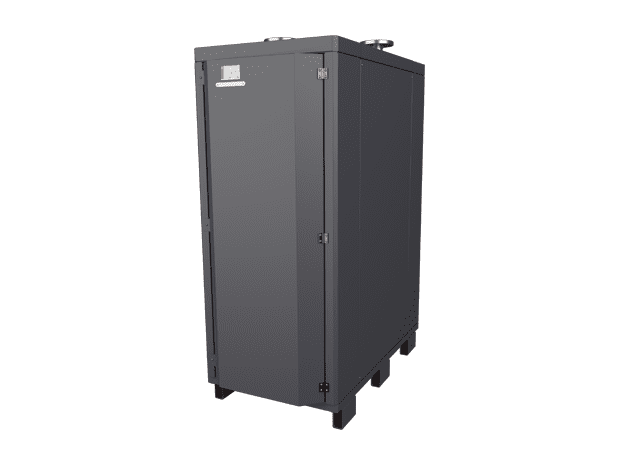Heat the Streets: A blueprint for decarbonising home heating in the UK

Project Booklet
Quick Links
Heat the Streets Case Study: Project Overview
The Heat the Streets project has successfully demonstrated that Networked Heat Pumps are a viable alternative to the UK gas network and a scalable pathway for the shift to low-carbon heating. The primary objective was to demonstrate a scalable path towards renewable heating systems.
Over two years, the project installed the technology in 96 new and existing private and social homes across Cornwall. It connected the ground source heating systems to Shared Ground Arrays, a communal network of underground pipework that extracts renewable heat via boreholes. Now they’ve been installed, the boreholes are visually unobtrusive, providing a reliable heat source all year round.
This initiative was partly funded by the European Regional Development Fund (ERDF) and offered low-carbon solutions capable of reducing energy bills by up to 50% and curbing carbon emissions by an impressive 70%.
To achieve these goals, the project focuses on replacing conventional heating systems with ground source heat pumps, effectively addressing three critical issues:
- Fuel poverty,
- Thermal comfort,
- Carbon dioxide emissions reduction.
Kensa worked with a mix of privately owned homes and social housing properties owned by Coastline Housing LTD. Through Heat the Streets, Kensa Utilities has effectively demonstrated the large-scale retrofitting of GSHPs in privately owned and social housing properties across various locations in Cornwall.
World’s first in-road ground array


Heat the Streets is a pilot study demonstrating that GSHPs can be retrofitted to domestic properties without needing a ‘fabric first’ approach at scale and with no upfront cost to the customer. It reflects the approach to mass, street-by-street roll-out of GSHPs in a networked, coordinated fashion.
21st Century version of the gas network


The strategic importance of Heat the Streets’ business model as a method of securing private finance to support area-based decarbonisation has garnered significant media coverage. Articles from The Guardian, the Financial Times, BBC, Countryfile, and ITV promote treating ground array infrastructure as the UK’s next utility service, replacing the gas network and reducing the upfront cost of low carbon heating and cooling for new build and retrofit properties.
As the innovative project concluded, it coincided with Nesta and Element Energy publishing separate thought-provoking reports on the public perception of heat pumps, as well as deployment of networked heat pumps, as demonstrated on Heat the Streets, and what this could mean for UK energy systems if rolled out at scale.
Under the framework of Heat the Streets, Kensa has spearheaded a unique approach to GSHPs, utilising shared ground loop arrays (SGLA) connected to individual GSHPs. The SGLA functions as a thermal energy supply and storage grid, circulating low-grade heat through a network of pipes to individual GSHPs in separate dwellings. The GSHPs then upgrade this heat at the point of use to provide heating and hot water whenever necessary. This distribution of heat harvested from the ground at ambient temperatures (-5 °C to 20°C) results in exceptional efficiencies, minimising heat losses and avoiding overheating issues associated with central plant rooms.
Heat The Streets Case Study: Private Retrofit
Retrofit Key Facts:
- 71% carbon savings
- Average bill saving of £628 p/a
- GSHP Systems installed in 28 private homes
- GSHP Systems installed in 38 social housing properties
- Average bill savings £628 p/a
- 5x over subscribed project
- 22 homes enabled for future connection
- All homes retrofitted with NO change to the building fabric
- £3.8m paid into the local economy
- Householders can switch energy suppliers.


Kensa Utilities’ Director of Business Development, Lisa Treseder, states:
By implementing a street-by-street approach and pre-installing sustainable ambient loop infrastructure, entire communities can gradually transition to individual Networked Heat Pumps. This enables households to switch from their gas boilers to GSHPs easily and affordably, with minimal disruption. Homeowners are not burdened with the capital costs of ground array installation and have the flexibility to choose their preferred GSHP, installer, and energy tariff, similar to when they replace their gas boilers and energy supplier contracts.


Through information sessions and recruitment campaigns, the project team engaged with residents and compiled a list of areas suitable for deploying ground source heat pump infrastructure within the village. Contractors created a shortlist for installations in Phases 1 and 2, and a specialist design team was created based on cost efficiency and practical considerations.
Selection criteria included:
- Clusters of homes that expressed interest in participating.
- Ease and speed of installation, with no special considerations such as proximity to overhead cables.
- Replicability, demonstrating the suitability of this approach for medium-density, typical British housing stock.
By showcasing successful implementation in Stithians, Kensa aims to provide valuable insights for policymakers, housing developers, and social housing providers regarding the potential of ground source heat pumps as a viable solution for decarbonising heat in the UK’s housing sector.
Heat the Streets Case Study: New Build
Summary
Ground-source heat pumps are installed in newly built homes for the same price as an air-source heating system. Heat the Streets’ new-build developments allow new owners to benefit from lower running costs, maintenance costs, and carbon than if they had received air-source or storage heaters.
Key Facts
- Ground Source for the price of air source
- 28% Carbon savings
- Exempt from Heat Network Metering & Billing Regulations.
- Extremely low CO2 emissions;
- Easy carbon & building regulations compliance.
- No NOx, SOx or particulates emissions.
- Lowest energy bills – slightly lower than mains gas, significantly lower than air source heat pumps, LPG & oil.
- Householders can switch energy suppliers.
- No district heat losses.
- Ultra-efficient and reliable.
- 30 systems installed
Ground Source for the price of air source
Through Heat the Streets, Kensa has effectively demonstrated cost-effective integration into new-build developments across various locations in Cornwall. Since the project began two years ago, Kensa has been able to harness project learnings to launch their funded array offer to new-build developers, reducing upfront capital costs and allowing them to take advantage of all the benefits of ground-source heating for the price of air-source heating.
Kensa is revolutionising the cost dynamics of ground-source heating systems, making them more affordable than air-source heat pumps and even traditional gas boiler systems. This zero-cost infrastructure offering enables house builders to incorporate an appealing heating system while reducing construction expenses and facilitating carbon compliance.
In alignment with the government’s commitment to achieve carbon neutrality by 2050, it is mandated that all new homes will be prohibited from installing gas and oil boilers by 2025. Instead, low-carbon alternatives must be adopted. Kensa’s Heat the Streets project has garnered significant interest from developers who aim to future-proof their developments.
Cost and Emission Reduction
The strategic importance of Heat the Streets’ business model as a method of securing private finance to support area-based decarbonisation has garnered significant media coverage. Articles from the Financial Times, BBC, and ITV promoted treating ground array infrastructure as the UK’s next utility service, replacing the gas network and reducing the upfront cost of low carbon heating and cooling for new buildings and retrofit properties.
Heat the Streets developments offer compelling advantages by installing ground source heat pumps in new-build homes at a comparable price to air source heating systems. These include lower operating costs, reduced maintenance expenses, and decreased carbon emissions compared to alternatives such as air-source or storage heaters.
For new build customers, the annual connection fee is just £250, which is highly competitive compared to the gas standing charge. This affordable cost ensures that the adoption of this technology faces no additional barriers while all customers benefit from reduced operational expenses for the entire system.
Integrated with ground source heat pumps, Kensa’s Shared Ground Arrays form an ultra-low temperature heat network. This configuration, resembling traditional gas infrastructure, connects a series of boreholes to create a shared ground loop array that supplies heat to multiple properties – this is known as Networked Heat Pumps. Ownership of the ground array remains with Kensa Utilities, and households pay a fixed annual fee.
This innovative split-ownership funding model for low-carbon heating aims to eliminate obstacles to achieving net-zero goals and make clean, reliable heating affordable for a broader range of households.
Thanks to Kensa Utilities’ financing model supported by the European Regional Development Fund, we have successfully installed heat pumps and the associated infrastructure at a lower cost than air source heat pumps. This means developers can offer more attractive and sustainable heating systems while reducing construction expenses and carbon emissions.
The Funded Array Model


In this arrangement, Kensa Utilities owns the ground array, which comprises the underground pipes facilitating heat absorption by the ground source heat pumps. At the same time, homeowners maintain ownership of the heat pump unit. This model is comparable to arrangements currently familiar to residents in gas networks, and it contributes to making the installation costs similar, if not lower, than those associated with air-source heat pumps.
This makes this eco-friendly option more accessible to developers by only requiring them to have the upfront cost of the heat pump unit itself.
The funded array model makes the concept suitable for small and large-scale projects. As the demand for sustainable heating solutions continues to grow, ground-source heat pumps are gaining increasing popularity, thus fostering a greener and more sustainable future.
Find out more:
To learn more about Kensa’s funded array offer, join one of our webinars:
https://www.kensacontracting.com/ground-source-for-the-price-of-air-source-webinar/













Social housing providers
Working in partnership with Coastline Housing Ltd. The Heat the Streets project supported Coastline with its targets of achieving an EPC C rating by 2030 and carbon neutrality by 2050 while combating the growing issue of fuel poverty.
Gareth Jones, Contracts Manager at Coastline Housing, comments:
The project aimed to create a greener, more sustainable future while reducing energy bills and carbon emissions. It offers many long-term benefits, including
This durability underscores the project’s commitment to ensuring lasting environmental and financial advantages for all stakeholders.
World’s first retrofit of ground array infrastructure in the public highway
A key highlight of this shared ground array is its incorporation of isolation chambers, which allow our engineers to connect, maintain, or isolate specific array sections efficiently as needed. This flexibility has proven crucial in successfully implementing the Heat the Streets project, as residents in Collins Parc could connect to the system as soon as our team of experts engineered, filled, and commissioned each section of the array.
A notable aspect of Kensa’s ingenious design is eliminating a central pump responsible for maintaining fluid flow within the pipework. This necessity has been effectively removed through careful engineering, resulting in an infrastructure that requires no mains electrical connection or complex maintenance. This design choice significantly reduces operational risks associated with potential failures in central pump systems. Instead, the fluid flow is precisely regulated by leveraging pressure management and utilising individual ground source heat pumps within each dwelling. This streamlined approach enhances reliability and contributes to the system’s overall efficiency.
Kensa Utilities’ achievement in Collins Parc showcases a commitment to pioneering advancements in ground source heat pump technology, providing forward-looking and efficient sustainable heating solutions.